The “black box” of electricity bill increases – Common front by Greece, Bulgaria, Romania, Hungary
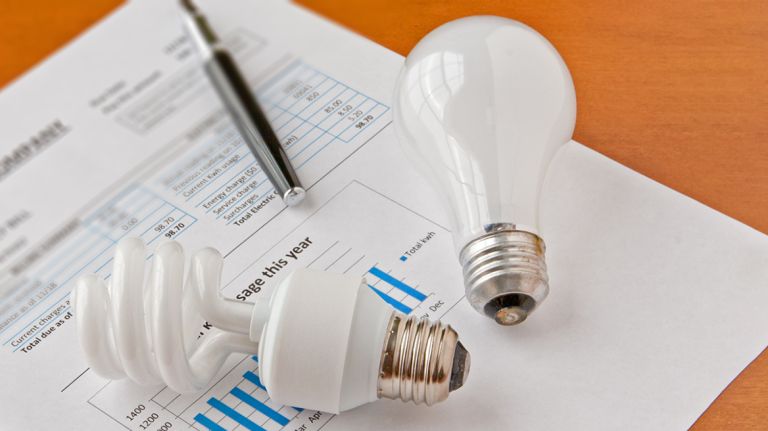
Πηγή Φωτογραφίας: Διαδίκτυο//The “black box” of electricity bill increases – Common front by Greece, Bulgaria, Romania, Hungary
If the energy crisis was a nightmare, the spike in energy prices, since July, seems like a rude awakening back to the nightmare reality: while in winter prices – due to high demand for heating – are high across Europe, in the summer when Eastern Europe is hit by cold weather (and increases consumption by at least 40%) prices (re)rise locally. So our region ends up having expensive electricity in winter – summer…
With the phenomenon of extremely high prices (at record levels) affecting the energy system of South-East Europe, Greece, Bulgaria, Romania, Hungary and other countries are preparing to call for the creation of a permanent mechanism to drop prices.
The first step in this direction was taken with Greek Prime Minister Kyriakos Mitsotakis raising the issue at the highest European level, in a letter sent to Commission President Orsula von der Leyen. In it, Mitsotakis explains that European market pathologies have resulted in sharp and large price increases, calling on Brussels to immediately provide a “political response” to the “protracted crisis”. In his letter, the prime minister calls on the EU to take action to increase cross-border energy transmission capacity, i.e. strengthen interconnections between member states, and stresses the importance of better oversight of the European market, which he describes as a “black box” that is “incomprehensible even to experts.”
Letter also to the Commission
In a second phase, another letter will follow, from Greece, Bulgaria and Romania as a non paper to the Commission, in which the problem of extreme energy prices will be analysed – and even with specific examples and figures. The…final battle is expected to be fought in mid-October, when the Energy Council of Ministers is expected to hold a meeting to discuss the joint initiative undertaken by Greece, Romania and Bulgaria to de-escalate electricity prices.
The request already submitted by the three countries for structural changes to the European target model energy system will also be discussed there. Greece, Romania and Bulgaria will request that the countries of South East Europe have and manage a permanent mechanism that can exclude them from the Eurosystem when there is an “endemic phenomenon”, i.e. when there are conditions for the creation of extreme electricity prices that are not due to production and demand, but to the weakness of interconnections that creates an “energy island” in our region.
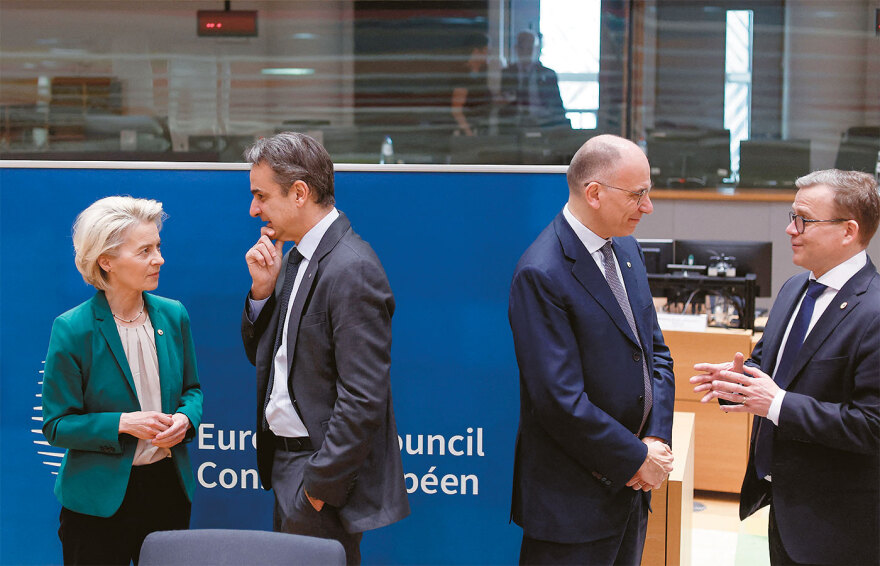
Yes, but why is electricity (re)expensive?
The tariff burden borne by the mainly Balkan countries when it comes to energy is demonstrated by the cost divergence between them and the other Balkan countries. Typical is the fact that in the first ten days of September,Greece had an average price of 146.28 euros per megawatt hour, Romania 158.74 and Bulgaria 146.34 euros per megawatt hour. This, while the average price per megawatt hour in France for the same period was 77.21 euros and in Germany 94.41 euros. As far as the maximum wholesale prices are concerned, the figures are even more…frightening, having exceeded EUR 940 per megawatt hour and are heading towards EUR 1 000. So why is this happening?
Experts explain that this phenomenon is “entirely to be expected”, since a “desperate consumer” has suddenly emerged on the market, causing distortions in the target model and the energy market itself. The reason is Ukraine, which used to be one of Europe’s major energy producers. However, Russia’s strategic choice to bomb its energy grid has forced the country to shut down its nuclear power plants. And as Ukraine has been drained of power, it has been forced to become an energy importer, paying as much as it does.
It is this as much as is causing the great distortion. Lately, and as Russia has stepped up its bombing, Ukraine has been buying energy at a cost that averages around 6,000 euros per megawatt hour and has gone as high as 9,000 euros per megawatt hour! In this case, the ultimate speculative aspect of the law of supply and demand appears: that is, while there is no energy shortage and production is sufficient to meet demand, the ‘desperate consumer’ unwittingly pushes up the price for others, especially those who are cut off from the rest of the market. But why does this apply to Greece, Bulgaria, Romania and the other Balkan countries and not to those in Central and Northern Europe?
The wolf, they say, rejoices in the fray and, when that happens, will target the sheep outside the fold. In our case, Greece and our other neighbouring countries appear to be isolated on an “energy island”. In other words, they do not have enough interconnections – cables, to explain it more popularly – to transfer energy to our networks, which, of course, is not the case in other European countries. In our case there is a triple disadvantage: on the one hand, it is Ukraine that pushes up electricity prices (since it pays dearly for it) and on the other hand, the weakness of interconnections that puts the Balkan European countries in a difficult position, as a cut-off island when it comes to energy.
The target model, the system adopted by the European Union, not only doesn’t help, it makes the situation worse. This is because, the target model has the weakness that “despite the fact that there is no change in the cost or quantity of energy produced, there is the ‘desperate consumer’, due to which the last price given to clear the market is on the verge of insanity. The target model gives the last price to everyone and they (the producers) all make crazy money, with the exception of Renewable Energy, which operates on tariffs.”
The European system accepts the extreme prices as an average, the same sources explain, to send a signal to the market. The signal the market gets in this case, however, is that producers get more money. As this money is paid by consumers, the Greek side argues – and it makes perfect sense – that it makes absolutely no sense to direct this money to the producers when interconnection investments (cables) are needed, which should be made by the network operators. This is when the interconnections are again paid for by consumers and done by the providers at a hard regulated rate. In other words, it is the… definition of absurd: the system provides for extreme prices to be calculated to signal to regulators to make investments that will prevent energy islands, but gives the money to the producers.
The problem, which is pushing prices to extreme levels in our region, is good weather. This summer (or, rather, this summer) has been the hottest on record on the planet, and in the countries of Southeastern Europe it’s essentially been a continuous, three-month heat wave with record temperatures.
This brought an increase in consumption due to the need to use air conditioners to such an extent that, in the case of Greece, it reached 40% during the three months of summer. And while at the same time the rise in average temperatures attributed to the climate crisis is leading other, traditionally cold European countries to the need to use air conditioning, this is a trend that – based on what scientists predict – if not intensified, will continue in the coming years, with summers getting hotter and therefore demand soaring.
In this case the “law of the market” takes over, whereby higher demand due to extreme weather conditions leads to an increase in the price of electricity. This would not be catastrophic in itself, but combined with the surge in demand from Ukraine and the “energy island” effect, it allows producers to speculate, pushing up prices. Renewables could provide the solution by providing the necessary energy at a consistently low cost, but they have the disadvantage of not producing 24/7 and are largely dependent on weather conditions.
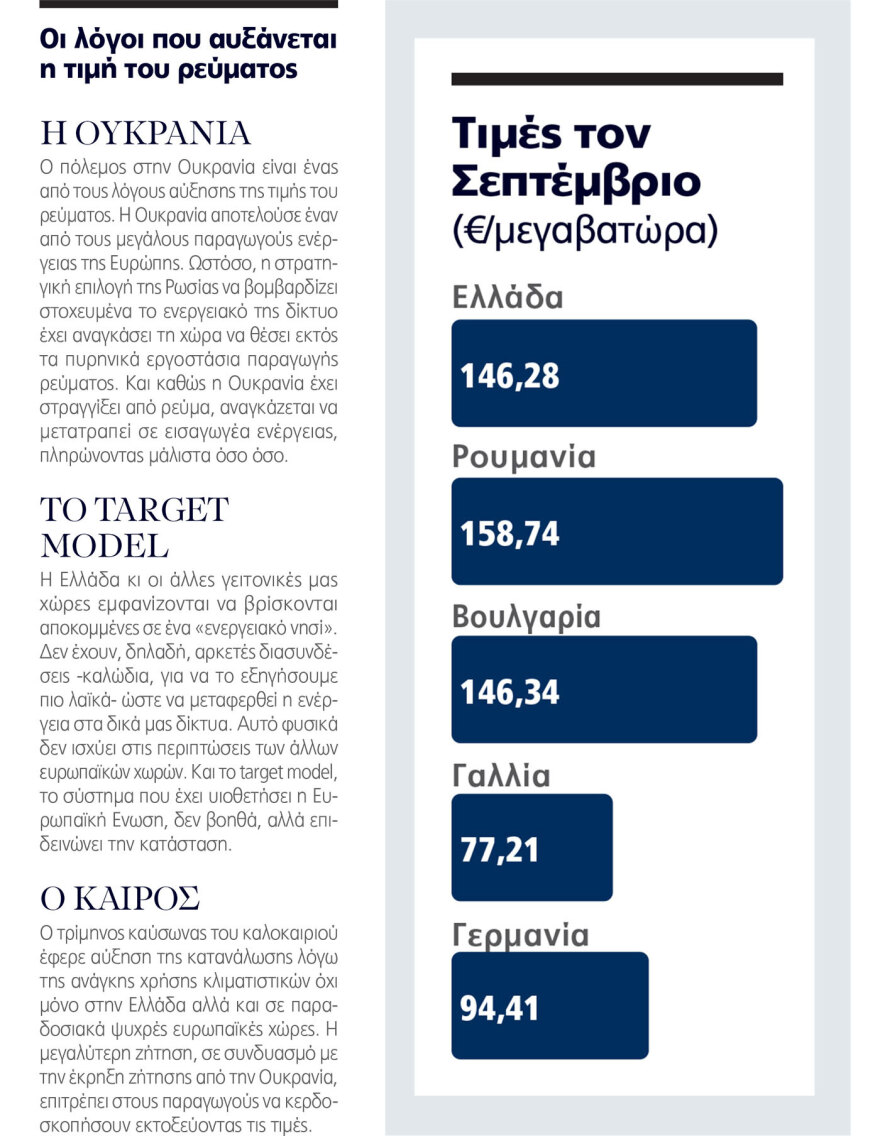
Mitsotakis intervention
This imbalance of demand, which is expected to become a permanent and ever-increasing phenomenon in our region during the summers, the dysfunction of the target model and the irregularities caused by the Ukraine factor in the European market, are some of the issues that Greece will raise with Romania and Bulgaria in the Eurofamily. The prime minister, from the podium of the TIF gave his stamp, announcing the raising of the issue from his side with the letter to the president of the European Commission.
There, he said, he would explain that “we say we have a single market, we have the target model, but it has not worked in recent months. And I have to tell you that in the next few days I will raise this issue in a letter that I will send to the president of the European Commission, Mrs von der Leyen, explaining exactly what happened, not only in Greece, but also in Bulgaria, in Romania, in Hungary. And how it is possible that there are times of the day when the marginal price of the system is 10 times more expensive in the Balkans than it is in Austria or the Czech Republic. Something is not working right. Something is not working well in the European model.
We export energy to Ukraine, but the Greek consumer will not pay for the distortions of the European model. We will take the excess profits, we will return them to consumers so that they have prices below 15 cents a kilowatt hour. In retail prices, Greece is well below the European average. I will fight to correct these distortions.”
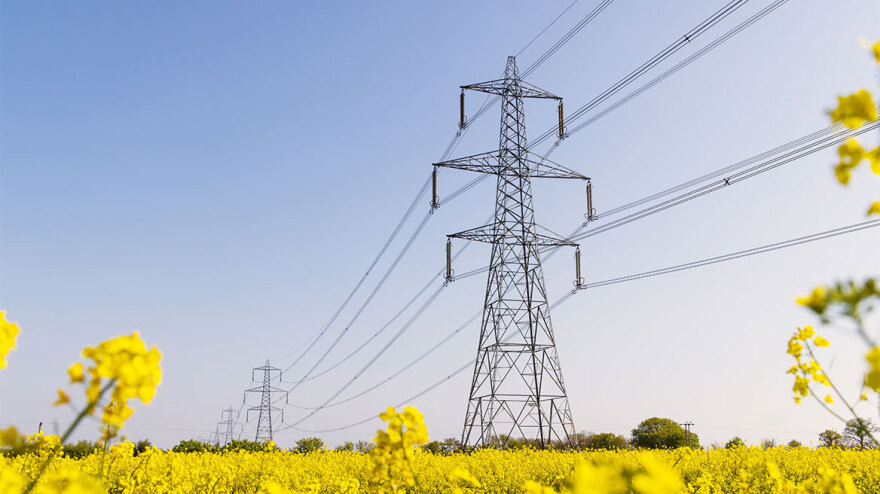
The good and rather expected scenario wants the Greek proposals to be accepted and this intervention mechanism to be created whenever the above imbalances are observed. The request for the requesting countries (Greece, Romania, Bulgaria) is that this mechanism should be permanent and controlled by them. However, even assuming that this proposal is accepted on 15 October (at the ministerial meeting) and the mechanism is set up the very next day, the results will not be seen very soon. The prime minister has said pointedly that “I don’t expect there to be any immediate solutions”, while energy ministry officials also say that the impact (and especially what the average consumer will see) will be in the medium to long term.
Essentially, the government has decided to step in, as it has done to date, when electricity prices go out of line, lifting some of the burden on consumers. And what benefit will the mechanism bring? First of all, to make an effort to control speculative phenomena, but most importantly to direct profits to the operators so that investments can be made to complete the interconnections and lead to the elimination of the “energy island” phenomenon.
The latter will also lead to the final elimination of the phenomena of speculation in the energy market, but one realizes that for a number of reasons it cannot be realized as quickly as the Cyprus interconnection cable, which is a very important project especially for Cyprus, since it essentially breaks its energy isolation.
An unexpected ally on Greece’s energy issue is former ECB president Mario Draghi. The former Italian prime minister, in a report for the Commission, advocates a comprehensive overhaul of the way the EU increases investment financing, including “new joint financing and common assets”.
In his report, “Super Mario” calls for a common secure asset and common EU funding to support “European public goods” such as shared energy infrastructure, and proposes reforming the energy market so that the price of cheap energy from renewables is no longer dictated by the cost of more expensive fossil fuels. It diagnoses fundamental issues with the EU energy market and concludes that infrastructure investment is slow and sub-optimal for both renewables and grids.
Source: protothema.gr
Διαβάστε όλες τις τελευταίες Ειδήσεις από την Ελλάδα και τον Κόσμο





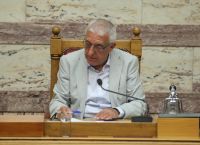





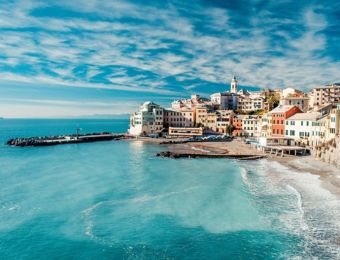
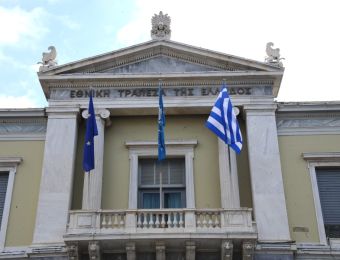



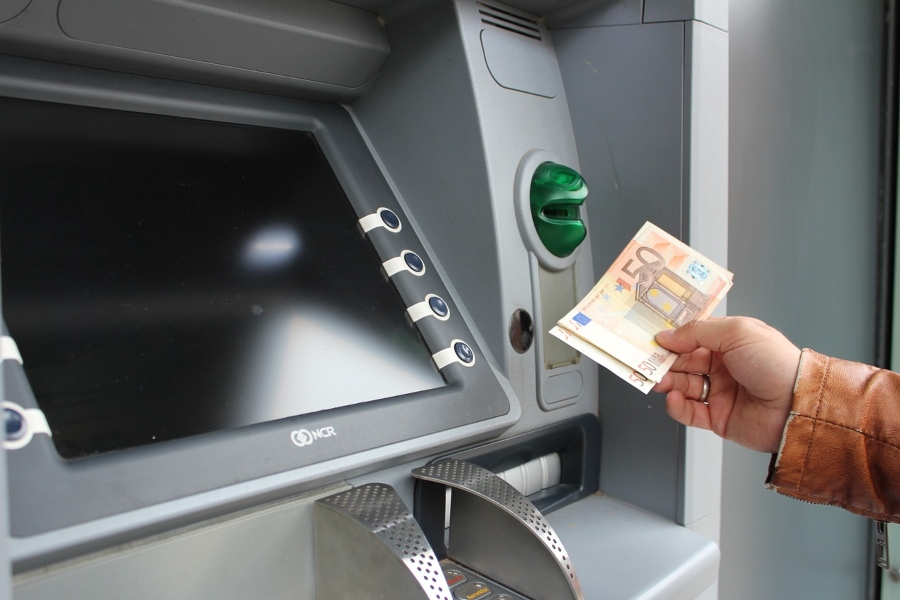



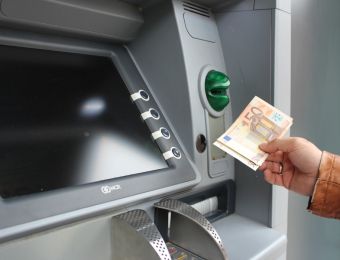








Το σχόλιο σας